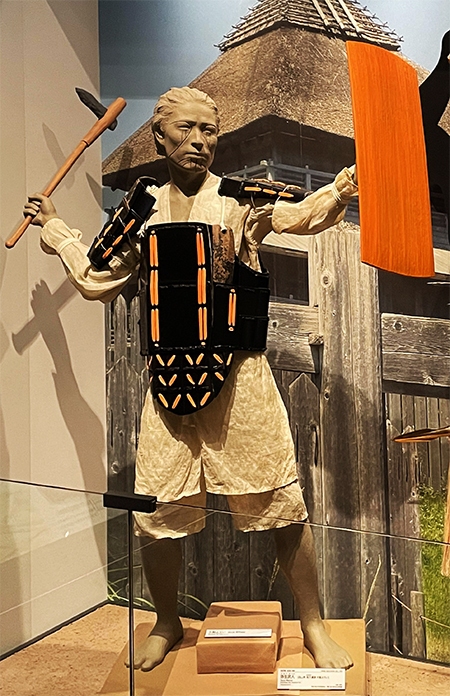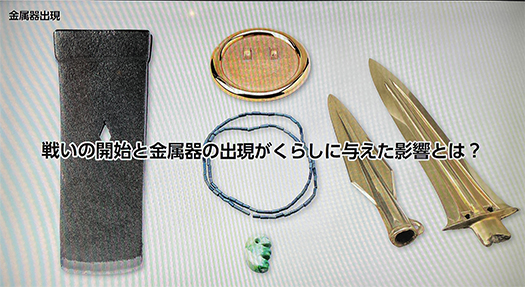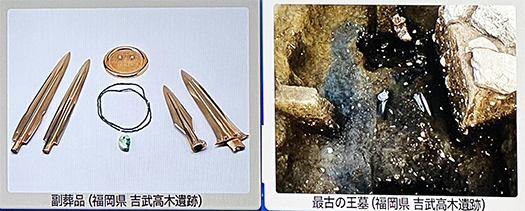


弥生の水田稲作はそれまでの縄文の世の人口密度を一変させた。
食糧生産の究極的な「効率化」が計られたのがアジアでは水田稲作であり、
その最適な環境のひとつとして日本列島があった。
土地利用の観点からすると、人間一人あたりの必要カロリー取得可能面積において
弥生:縄文では一説では1:400というほどの違いがあるとされるほど
農耕は人類生存の形態を大きく変えたと言えるのでしょう。
それまではたぶん「土地」という観念が人類にはなかったのが、
その後の「一所懸命」的思想がひろく人間のこころを支配していく。
もちろん狩猟採集という経済でも効率化バイアスは働き、
武器の高度化という意味では相互関係が働いたと思えるけれど、
こと農耕という経済社会ではこの「土地」の有用性・支配権を巡って
戦争という概念がごく自然発生的に巻き起こっていった。
ことは経済の事柄であるのでこの変化は否応なく、としか言いようがない。
マルクスエンゲルスの唱えた「原始共産制社会」というのは疑問だと思うし、
むしろ農耕の人類社会での一般化からの必然として権力の発生は理解できる。
軍事力というものが発生するのは自然。
人類社会はこの争闘の根本原因に対し制御方法を考えて行くことになるけれど、
当面する対手が存在すれば、それとの関係性に於いて軍事力を持たなければ
対等の交渉もできないことは子どもでも理解できる原理。
基本構造の経済における利用資源として鉄器の技術発展があって
それはそのまま軍事転用可能な武器生産とも連動していった。
こういうこと対応の社会的機能として「ムラとクニ」概念が生まれ、
それら同士での緊張関係、相互関係が、より巨大な地域統合を促すことも自然。
近隣関係でもめ事が起こったときにそれを平和的に解決するのに
より大きな「幻想」的共同体の調停力は必要でもあっただろう。
人類社会発展の「加速度」機能を果たしたものがこういう経済基盤と
社会統治としての国家権力であったことは否定しようのない事実。
中国大陸では初の中央集権統一国家・秦が紀元前221年に成立した。
それとどのように対応して行くべきか、日本の弥生社会は
相当の緊張関係を孕みながら、徐々に統一的王権に向かっていった。
一方、戦争と権力が、技術と経済を大いに発展させていった。
吉野ヶ里遺跡でもごく近距離に「鍛冶」の工房が営まれていたし、
飛鳥の都でも同様の鍛冶場が王権に近接して営まれていた。
始原期の権力にとって農耕発展のために金属機器を生産し下賜する能力は不可欠。
またそういう権力の誇示として権力者的装身具として
「キラキラ」したるものは、誰の目にもわかりやすかったのだろう。
English version⬇
[Power and war are the origins of the state. 37,000-year history of the Japanese archipelago – 34]
Overwhelming power for rice paddy farming with the ability to maintain and develop the population. Further accelerated by the development of metal equipment. The economic structure created and nurtured power. …
Paddy rice cultivation in the Yayoi period transformed the population density of the Jomon period up to that time.
The ultimate “efficiency” of food production was achieved through paddy rice cultivation in Asia, and one of the best environments for this was the Japanese archipelago.
One of the best environments for this was the Japanese archipelago.
From the perspective of land use, the Yayoi: Jomon period was the most efficient in terms of the area available to obtain the necessary calories per person.
The Yayoi:Jomon ratio is said to be as large as 1:400.
Agriculture has changed the way human beings survive.
Until then, humans probably did not have the concept of “land.
The “working hard” philosophy that followed dominated the human mind.
Of course, the efficiency bias also worked in the hunter-gatherer economy.
In a hunter-gatherer economy, of course, there is an efficiency bias, and it seems to have been interrelated in the sense of the sophistication of weaponry.
In an agrarian economy, however, the concept of war over the usefulness and control of the land is a very natural outgrowth of the concept of war.
The concept of war emerged quite spontaneously in an agrarian economic society.
Since this is an economic matter, this change can only be described as inevitable.
I think that the “primitive communist society” advocated by Marx Engels is questionable and
Rather, the emergence of power as an inevitable consequence of the generalization of agriculture in human society is understandable.
The emergence of military power is natural.
Human societies will find ways to control the root causes of this struggle, but if there is an immediate countermeasure, it will be a military force.
If there is an immediate opponent, it is impossible to negotiate with it on an equal footing without military power in relation to it.
Even a child can understand this principle.
The technological development of ironware as a resource to be utilized in the economy of the basic structure
This was directly linked to the production of weapons that could be used for military purposes.
The concept of “mura and kuni” was born as a social function to cope with such a situation.
Tensions and interrelationships among them naturally promote greater regional integration.
When a dispute arises in a neighborhood, it can be resolved peacefully by a larger “illusory” community.
The mediating power of a larger “illusory” community would have been necessary to peacefully resolve disputes in neighboring relations.
The “acceleration” function of human social development was fulfilled by this kind of economic infrastructure and state power as social governance.
It is an undeniable fact that the “accelerating” function of human social development was this kind of economic infrastructure and state power as social governance.
In mainland China, the first centralized unified state, Qin Dynasty, was established in 221 BC.
How should we deal with this, and how should Japan’s Yayoi society deal with it?
The Yayoi society in Japan gradually moved toward a unified kingship, with considerable tensions.
On the other hand, war and power led to great technological and economic development.
At the Yoshinogari site, a “forge” workshop was operated within a very short distance, and a similar forge was operated in the Asuka capital.
Similar forges were operated in the Asuka capital in close proximity to the royal authority.
The ability to produce and gift metal equipment for the development of agriculture was essential for the primitive powers.
The ability to produce and bestow metal equipment was essential for primitive power to develop agriculture, and as a demonstration of such power, “shiny” objects were used as power ornaments.
The “glittering” objects were easily recognizable to all.
Posted on 12月 4th, 2022 by 三木 奎吾
Filed under: 日本社会・文化研究, 歴史探訪







コメントを投稿
「※誹謗中傷や、悪意のある書き込み、営利目的などのコメントを防ぐために、投稿された全てのコメントは一時的に保留されますのでご了承ください。」
You must be logged in to post a comment.